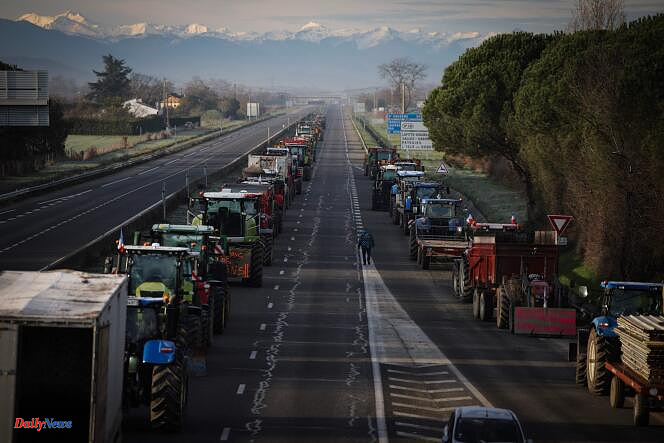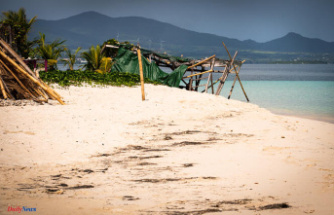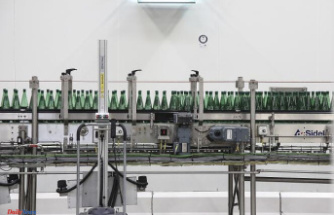The anger of farmers which is spreading in Europe is not sparing France, where numerous mobilizations continued on Monday January 22. Since Thursday evening, several dozen operators have been blocking the A64 motorway, which links Toulouse to Bayonne, near Carbonne, in Haute-Garonne. They are asking the government for emergency measures for their profession, denouncing in particular the low level of their income.
Gérald Darmanin affirmed Monday that he had not requested “the evacuation by the police” of the farmers responsible for the blockage. Asked about the actions of farmers on the sidelines of a press conference dedicated to the Olympic torch relay, the Minister of the Interior explained his decision by the fact that there was “no damage to this site [ that of the A64]”.
For the fifth day in a row, motorists traveling on this axis must leave it before the blockade formed by around forty tractors, to return to the highway a little further on.
In Tarn-et-Garonne, three access roundabouts to the Golfech nuclear power plant, which supplies electricity to the Toulouse basin, have also been blocked by around fifty tractors since Monday. Just before noon, several dozen demonstrators occupied the lanes of the A9 motorway in the Montpellier-Barcelona direction at the Perpignan-Sud toll, disrupting road traffic on this axis.
Call for “concrete responses”
At the heart of the demonstrations, financial burdens and environmental standards considered too heavy. These reasons for discontent are recurring in a profession that the government has been trying to manage for years to avoid opening a new social front.
Arnaud Rousseau, the president of the FNSEA, the main French agricultural union, announced on France Inter that “actions” would be carried out “as long as it is necessary”. These actions will concern “each department”, he said, stressing that “the rise in tension is strong, hence the need to provide concrete responses”. Before a meeting Monday evening with the Prime Minister, Gabriel Attal, Mr. Rousseau once again asked for “concrete answers” to the “despair” of farmers.
The Prime Minister, faced with his first crisis since his appointment on January 11, will receive the president of the FNSEA and his counterpart from Young Farmers (JA), Arnaud Gaillot, at 6 p.m. Other agricultural organizations (Rural Coordination, Peasant Confederation) also ask to be received. If the government is “not there”, “we could be at the dawn of a big agricultural movement”, declared the president of the JA on Monday morning, on France 2.
“Hydraulic fund” of 20 million euros
In December, former Prime Minister Elisabeth Borne announced to the FNSEA and the JA the abandonment of tax increases on pesticides and irrigation, arousing the irritation of environmental organizations and water stakeholders.
Monday, in Vendée, the Minister of Agriculture, Marc Fesneau, announced the launch, already in the pipeline, of a "hydraulic fund" to help farmers invest in water storage, the reuse of wastewater or irrigation efficiency. It must be supplemented by 20 million euros “from 2024”, according to his office.
In this territory which has had irrigation reserves for years, described as “basins” by their detractors, he also reaffirmed that the government would work to reduce procedural times to accelerate the construction of such facilities.
The government fears a conflagration because, from the Netherlands to Romania via Poland and Germany, farmers are stepping up actions against tax increases and the European Green Deal. All this against a backdrop of inflation and competition from Ukrainian imports.
The United Kingdom is not spared: fruit and vegetable producers will demonstrate on Monday in front of Parliament in London to protest against the “unfair” purchasing contracts which bind them to mass distribution.
Agriculture bill postponed
In France, the profession is also scalded by the successive postponements of the agricultural bill, promised more than a year ago by Emmanuel Macron and ultimately less ambitious than the “agricultural orientation law” initially announced.
On Sunday, Marc Fesneau announced a new deadline. The text, which was to be presented to the Council of Ministers on Wednesday, will only be presented in “a few weeks” with the aim of being debated in Parliament “in the first half of 2024”.
The bill that the government must present intends to promote generational renewal in agriculture, a necessity at a time when the population of nearly 500,000 farm managers is aging.
Less than five months before the European elections, the oppositions are courting the agricultural world. Starting with Jordan Bardella, president and head of the list of the National Rally, who on Saturday castigated the wine-producing Gironde as “Macron’s Europe which wants the death of our agriculture”.
Both the right and the left have asked the executive to renounce increasing taxation on non-road diesel, a progressive measure, negotiated this summer between the Ministry of the Economy and the majority union FNSEA, in exchange for compensation.
Operators “have no other choice but to use them,” noted the head of the Communist Party, Fabien Roussel, on Sunday. We must “immediately renounce this measure”, affirmed the leader of the Les Républicains deputies, Olivier Marleix, providing “very clearly” his support for the mobilization. On the Brussels side, a meeting of agriculture ministers is planned for the start of the week.











